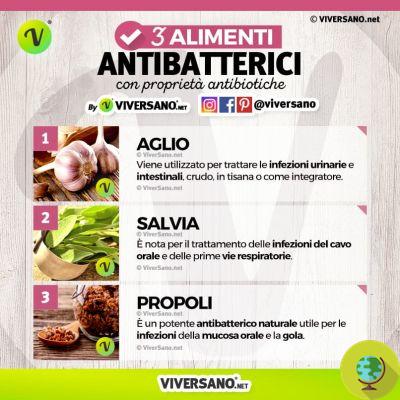
Natural antibiotics, the antibacterial properties of aromatic and medicinal herbs, to be used against coughs, colds, flu and infections.
Don't store avocado like this: it's dangerousLe herbs that we normally use in the kitchen they are not just simple condiments, but real ones natural antibiotics.
Nature offers us all medicines and remedies we need to prevent and treat the most common ailments, starting with colds and sore throats. The herbs and officinalis are used in herbal medicine and natural medicine in the form of essential oils, infusions, herbal teas and healing preparations. Let's find out the most important ones together.
Index
Rosemary
Among the most common aromatic herbs with antibacterial properties we find rosemary (Rosmarinus officinalis). It is used in the form of curative infusion, as well as seasoning. Its essential oil is among the most powerful natural antibiotics. It is especially suitable for the treatment of colds and can be used fresh or dry as a seasoning even every day. Also, according to the most recent scientific studies, rosemary improves memory.
Read also: Rosemary: its scent can improve memory
Timo
Il timo (Thimus vulgaris) presents antibacterial and antispasmodic properties. It is useful in the treatment of cough and inflammation of the throat, due to its antiseptic action. Calm coughs and colds. It can be used as a condiment. Its essential oil is useful for aromatic foot baths and for fumigations.
Read also: Thyme: properties, a thousand uses and how to grow it
Lavender
Lavender (Lavandula officinalis) is used for healing purposes mainly in the form of essential oil. It has anti-inflammatory, antibacterial and antifungal properties. It improves digestive disorders and acts effectively against headaches, as well as in case of infections. It is used in aromatherapy and for massages.
Echinacea
Echinacea is a perennial herb known for its antibacterial properties and the ability to strengthen the immune system. Its use, in the form of an infusion, decoction or natural supplement, is useful for prevent disease from cooling, as well as for their treatment. Applications of echinacea include bronchitis, sinusitis, respiratory infections, urinary tract infections, infections caused by yeast, and lymph gland problems.
READ also: Cold and flu? The natural answer is Echinacea
Mint
Mint (Mentha piperita) is known for its remarkable ability to counteract bacteria, viruses and fungi. Its applications take place mainly in the form of essential oils, infusions and herbal preparations. It is useful against colds, insect bites, nasal congestion, colitis, stomach pain, nausea and fever.
Read also: Mint: properties, benefits and uses
Eucalyptus
It is among the fundamental herbs in the care of respiratory diseases and cooling. It has antibacterial and expectorant properties. It is useful in case of colds, fever, sinusitis, cough, flu and arthritis. It is used in the form of essential oil and in herbal preparations for natural health care.
Chamomile
Chamomile has antibacterial, antifungal and antiulcerative properties, which have made it one of the natural remedies more popular for the washing of wounds. It is suitable for soothing eye irritation and redness, in the form of a cold infusion. It is used for the preparation of eye drops and calming and relaxing infusions. Counteracts nausea and stomach pains. Chamomile essential oil is very valuable in case of sunburn.
Kratom
The sage (Salvia officinalis) has antibacterial and antifungal properties. It can be used for the preparation of mouthwashes to disinfect the mouth and for gargling to help calm sore throats. Sage tea helps digestion. It is effective in the treatment of gingivitis e pharyngitis.
Coriander
Coriander is a natural antibiotic, a real green weapon against bacteria more resistant. According to the latest research, coriander oil can be used to treat foodborne infections and infections. It would also be one powerful weapon against staph methicillin-resistant aureus. Coriander leaves also have chelating properties and are useful for detoxifying the body from heavy metals.
Parsley
Parsley has antibacterial, anti-inflammatory and antioxidant properties. It is indicated in case of kidney disorders and bladder. It can be taken, in conjunction with other healing herbs, in the form of centrifuged or brew. It is used to stimulate diuresis and to purify the body of toxins.
Read also: Vegetable garden on the balcony: parsley
Marta Albè
Read also:
- The 5 natural antibiotics that are good for our health
- Natural antibiotics: 10 foods and herbs, real drugs


























